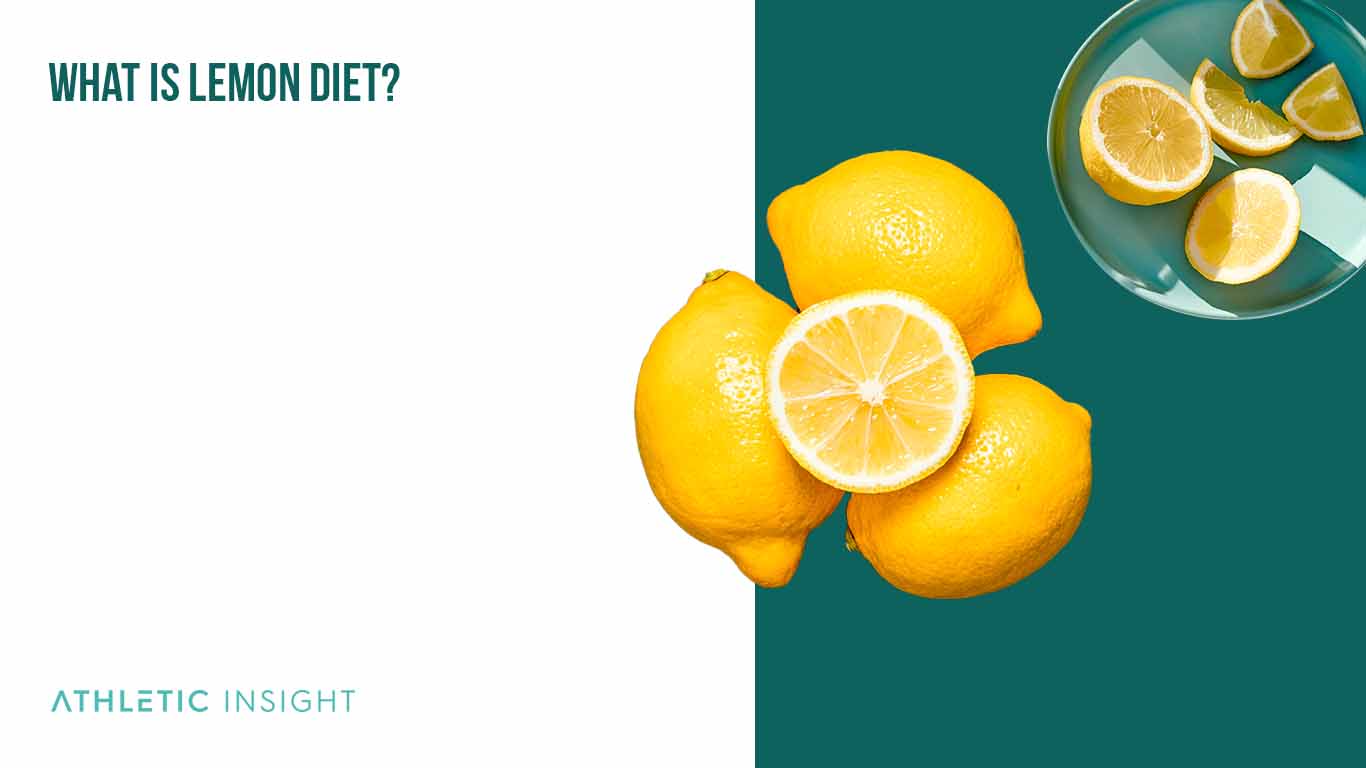The Lemonade Diet is a liquid-only meal plan that involves drinking three types of liquids for ten straight days. For the duration of the diet, you’ll live on nothing but a lemonade-like drink, salt water, and a special herbal tea that serves as a laxative.
Many people refer to the Lemonade Diet as the Lemon Diet or the Master Cleanse. This master cleanse diet is important because it can cleanse the body, especially the digestive system. It serves as a detox and weight-loss option with benefits like increased energy and mood.
The Lemonade Diet works by cutting out all food and living on liquids for a modified fast. Living on three liquids is meant to give the body sustenance while flushing out toxins and providing some caloric intake for energy.
What is a Lemon Diet?
The lemon diet is a juice-only meal plan or a fast that requires people to live on three different liquids for ten to fourteen days. This diet plan eliminates all solid foods for the duration of the cleanse. It also requires preparing the body to go off solid foods beforehand and then working up to eating again at the end.

Dieters can choose between three different beverages to consume throughout the day. It is best to use a combination of all three each day. Choose from a liquid drink consisting of lemons, limes, or cucumbers, a saltwater drink, or an herbal tea drink.
What Is the Other Term for Lemon Diet?
The other term for the lemon diet is the lemonade diet or the master cleanse diet. It’s called this because it’s supposed to thoroughly cleanse out the digestive system in 10 days by removing all toxins.
How Does Lemonade Diet Work?
When the body functions properly, it breaks down and removes toxins and harmful pollutants like chemicals and disruptive bacteria.
More specifically, the intestines break down food, absorb its nutrients, and solidify waste. After food leaves the stomach, it travels to the small intestine. The small intestines, the longest of the intestines, do most of the digestion of food by breaking it down into liquid form and absorbing most of its nutrients.
The large intestine, known as the colon, takes in the nutrients from food and then passes those nutrients into the bloodstream. From there, the large intestine eliminates the remaining nutrients as solid waste.
The liver functions as the major filtration system in the human body. It filters or separates toxins from the body and cleanses the blood. It also metabolizes nutrients, including medications and vitamins.
The kidneys function to make sure the body has enough water. It filters the blood, removing excess waste from the body.
When pollutants overwhelm the digestive system, it can cause fatigue, mental fogginess, and overall unhealthiness.
The Lemonade Diet aims to cleanse the digestive system of harmful pollutants by flushing them out. Plus, with no solid foods in the stomach or digestive system, the liquid flushes out the toxins faster.
What Is the Main Purpose of Lemonade Diet?
The main purpose of the Lemonade Diet is to drop weight fast. Many people note losing up to 10 pounds with this liquid diet.
While most people believe the main purpose of the lemonade diet is the removal of unwanted or excess toxins in the body, there is no scientific support for this claim.
How To Do the Lemonade Diet?
Part of the draw of the Lemonade Diet is how easy it is to follow. Here are the three steps of this master cleanse:
- Prepare the Body a Few Days Before
- Start with Salt Water
- Drink 6+ Glasses of Lemonade Mixture
- Drink Herbal Tea at Night
- Work Back Toward Solid Foods
1. Prepare the Body a Few Days Before
Abruptly starting a liquid-only diet is not the best idea for the human body as it can be a bit of a shock to the system. It helps to wean off solid foods for a few days before to have a more successful experience. Follow a plan similar to the following.
- Day 1: Eat only whole foods, like fresh fruits and vegetables and whole grains.
- Day 2: Shift down to only vegetable broths and juices.
- Day 3: Drink only fruit and vegetable juices.
- Day 4: Begin the cleanse.
2. Start with Salt Water
Start off every day by drinking a salt water mixture. Add sea salt to lukewarm water and finish the whole beverage first thing.
3. Drink 6+ Glasses of Lemonade Mixture
Create the lemonade-type beverage by combining lemon or lime, a little maple syrup, some cayenne pepper, and hot water. Drink up to 12 glasses per day to stave off hunger.
4. Drink Herbal Tea at Night
Select a senna-based herbal tea to drink at night before bed. Only have one cup of tea per night.
5. Work Back Toward Solid Foods
Follow steps two, three, and four for 5-10 days for optimal results.
After completing the Lemonade Diet the body cannot take solid foods immediately. Start slowly introducing solid foods again by adding a little every day.
This is an example plan for returning to solid foods:
- Day 1: Drink orange juice or other freshly squeezed fruit juice.
- Day 2: Upgrade to smoothies or vegetable soup.
- Day 3: Add in fresh fruits and vegetables. It’s okay to steam or roast the vegetables.
- Day 4: Start eating solid foods again.
If any day creates too many issues with the digestive system, drop back a step until the body regulates and adjusts to the solid foods. It might take a few days of eating fresh fruits and vegetables to level out.
What are the Health Benefits of Lemonade Diet?
The health benefits of the Lemonade Diet include rapid weight loss, a shift towards healthier eating, and reducing insulin resistance.

- Rapid Weight Loss: It’s an extreme weight loss option for those looking to drop a little extra weight, typically 10 pounds or so. The program drastically reduces daily caloric intake, down to some 600 to 800 calories per day. That means it’s easier to burn more than you ingest. However, most of the weight loss is likely water weight because it causes more frequent urination and bowel movements.
- Shift Toward Healthier Eating Habits: Mentally, seeing rapid, successful weight loss can help spur people toward improving their eating habits. Making gains can trigger a shift toward eating better and exercising more after the diet ends.
- Reduce Insulin Resistance: At least one study found that a seven-day version of the lemonade diet reduced insulin resistance. It’s an important factor for people struggling to control blood sugar levels.
What are the Health Risks of Lemonade Diet?
There are some health risks tied to the Lemonade Diet such as inadequate nutrition, not sustainable for weight loss, often causes diarrhea, and left feeling hungry.
- Inadequate Nutrition: The Lemonade Diet doesn’t provide the necessary nutrients the body needs. Proteins, calories, and even “good” fats are necessary to support normal bodily functions. Because the calorie and protein intake are so low, this can cause gastrointestinal problems, muscle and bone density loss, headaches, fatigue, muscle aches, dehydration, malnutrition, and long-term weight gain. Further, the master cleanse diet can be dangerous for people with underlying health conditions such as diabetes or heart disease and harmful for children who need a steady diet of protein, carbs, and healthy fats for their physical and mental growth.
- Not Sustainable for Weight Loss: Since the rapid weight loss is mostly due to water and not fat, it’s generally temporary. It’s easy to gain weight back when the body gets solid food again. An up-and-down weight loss/weight gain cycle is never a good idea.
- Often Causes Diarrhea: Drinking senna-based teas can cause severe diarrhea and problems with the intestines because of their laxative properties. Without enough nutrients from proteins and carbs, the intestines release any nutrients stored in the body, which can cause malnutrition and dehydration.
- Left Feeling Hungry: Substantially cutting caloric intake and removing filling nutrients from the diet can lead to feelings of hunger. While drinking the lemonade-like beverage is supposed to resolve any hunger, it doesn’t typically work well for most people.
What Are the Foods That You Can Eat While on a Lemonade Diet?
There are no foods to eat while on a lemonade diet. This master cleanse is liquid-only and requires eating no solid foods for the entirety of the program.
What Are the Foods That You Should Avoid While on a Lemonade Diet?
The Lemonade Diet Food List is sparse and revolves around water. Avoid all solid foods while on this diet and only drink those ingredients listed in the provided quantities. It even takes a few days to work back into eating solid foods.
Who Should Do Lemonade Diet?
Nobody should do the Lemonade Diet as it is not a safe or sustainable option. It also carries some negative side effects for people with certain chronic health conditions, like diabetes and anemia.
However, some people turn to the master cleanse following gallbladder issues. The restrictive diet won’t exacerbate symptoms and may offer some relief. It is best to consult with a physician before using this liquid diet as relief for gallbladder problems.
Another time that people consider the Lemonade Diet is when they need to shed some excess weight in a short period of time. For example, people planning to attend a big event may start the process two weeks ahead of time to shed some excess pounds to fit into an outfit or feel refreshed.
It’s important to start the program plenty of time ahead of the event to accommodate weaning off solid food and working back into eating normally. Additionally, it’s a good idea to avoid this or any other fasting diet while entering a stressful time, like a wedding. Fighting hunger while under a great deal of stress is not conducive to weight loss or balancing physical and mental health.
What Is a Sample Lemonade Diet Recipe?
The Lemonade Diet involves three drinks with simple recipes.
- Salt Water Flush Recipe: Start every day of the cleanse with this salt water flush (2 teaspoons sea salt, 1 quart water). Combine the two ingredients and drink the entire quart.
- Lemonade Drink Recipe: Each day of the Lemonade Diet entails drinking between six and 12 glasses of this drink mixture. Combine the lemon juice, syrup, and water. Heat the water mixture until it is lukewarm to help the ingredients dissolve. Remove from heat and add the cayenne pepper before drinking.
- Herbal Tea Recipe: Cap off every day with a cup of senna-based herbal tea. Choose any flavor, but do not add sweeteners or cream of any kind.
What Are Ingredients for Lemonade Diet?
The Lemonade Diet requires few ingredients with a simple easy-to-follow menu. Stock up on the following ingredients to prepare for this master cleanse.
- Maple syrup: Maple syrup is one of the ingredients in the lemonade-like drink that sustains the bulk of the daily intake. It’s important to choose pure maple syrup and not a low-quality or flavored syrup, like Log Cabin or Hungry Jack. If it’s too challenging to find pure maple syrup, try substituting molasses for the same effect.
- Cayenne pepper: Another component in the lemon drink is a common spice. Though each glass only requires a dash of cayenne pepper, it gives the drink a little kick.
- Lemons or limes: Each glass of lemon drink uses about two tablespoons of lemon juice. Be sure to have plenty of lemons on hand. It’s okay to mix things up by working in some limes instead.
- Senna-based herbal tea: Finishing off every night with herbal tea helps with sleep and regulating the digestive system, so choosing a senna-based variety is best. Senna comes from the leaves and flowers of specific plants that have long been used for medicinal and laxative properties.
- Sea salt: The morning salt water flush is a key step in the master cleanse. Sea salt is the best option for this purpose because iodized salt can cause negative effects on the heart and mind.
- Water: Water is the key ingredient in the Lemonade Diet. While tap water is sufficient, it’s a good idea to use quality water, like filtered or spring water for a cleaner experience.
What Are the Facts About the Lemonade Diet?
Here are some key facts about the Lemonade Diet, such as whether it is healthy, if it’s for weight loss, if it is expensive, if it removes toxins, and how to transition into the diet.

Is Lemonade Diet Considered a Healthy Diet
No, the Lemonade Diet is not considered a healthy diet. It doesn’t provide the body with enough nutrients or calories to function. While the Lemonade Diet may help with rapid weight loss, it’s an unsafe approach that isn’t sustainable and could cause long-term harm.
Is Lemonade Diet for Weight Loss?
Yes, the Lemonade Diet is for weight loss. However, it is typically a short-term solution with most people regaining weight after ending the diet.
Additionally, the Lemonade Diet is not a long-term solution as it doesn’t provide the body with sufficient nutrients to function properly. If used too long, it can trigger a range of health issues.
Is the Lemonade Diet Expensive?
No, the Lemonade Diet is not expensive. Not only does it involve a limited, liquid-based meal plan, but the only ingredients are also easy to obtain and inexpensive.
Does the Lemonade Diet Remove Toxins?
No, the Lemonade Diet does not appear to remove toxins from the body any more than a typical balanced diet. There is no scientific research providing evidence that this liquid-based diet removes toxins from the body.
How to Transition Into a Lemonade Diet?
Since the Lemonade Diet is a liquid-based fast, it’s important to prepare the body for the drastic change. Weaning off solid foods and other vices makes it easier and it can look something like the following plan.
- Day 1: Eliminate all solid foods, alcohol, caffeine, and dairy products. Make a smoothie with fruits and vegetables.
- Day 2: Continue with smoothies, but try to mix up the combinations of fruits and vegetables.
- Day 3: Add soup broth to the smoothies and drink plenty of water.
- Day 4: Drink water and fresh-squeezed orange juice with a cup of laxative tea before bed.
- Day 5: Start the Lemonade Diet or Master Cleanse Diet.



